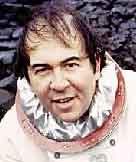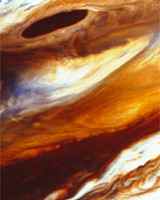|
Garry Hunt
–
physicist
|

|
"
Mars is fundamental to the future of the human race so it behoves us to explore and understand its physical environment from this millennium onwards."
|

|
| |
|
|
|
| |
How were you motivated to choose your particular field? |
| |
In my early life, this type of career never entered my mind. At school, my
skills indicated at an early stage that I would follow some form of
scientific career. I was always good at mathematics, so it was no surprise
that I read this subject at University and came out top of college, in the
University of London. However, I balanced my life with sporting activities
and played every sport possible at school. At University, I captained the
rugby club for 2 years and played top class club rugby (now professional),
before my career activities took over.
It was only after achieving my Ph.D. that space exploration and atmospheric
physics became a part of my life. The journey started in 1966, when I left
the University of London and took a research fellowship in association with
the Atlas Computer Laboratory near Harwell and the Clarendon Laboratory,
University of Oxford. Here I intended to make use of my mathematical
abilities, and apply my skills to the world of atmospheric physics. This
was the time when earth weather satellites were being developed, and
through my association with the Department of Atmospheric Physics, I became
involved in studying the earth's atmosphere from these remote platforms.
But it was apparent to me that similar approaches could be applied to the
atmospheres of the other planets in the solar system, which were still the
province of astronomical observers. I realised that with my background,
knowledge of meteorology and a desire to understand the physics of
atmospherics, there were many opportunities in the solar system which would
place Earth in perspective. I have been proved correct.
|
|

|
| |
|
|
|
| |
What can you share about your creative process? |
| |

|
|
The highlight of my career was when I became a member of the
Imaging Team on the Voyager mission to Jupiter and the outer planets. I was
even more thrilled and honoured to be the only UK scientist selected for
the mission. During the time of the Voyager encounters, with every passing
second we would see something new, make a unique discovery and answer a
fundamental question that had been unresolved for years, decades and even
centuries. I was a small part of an inspirational team of men and women who
were rewriting the textbooks. Now 20 years after the first encounter with
Jupiter, Voyager is still making the news, an exciting and inspirational
journey which is always with us.
I noticed this recently, when my son who was born in 1984, 5 years after
the Jupiter encounter had a Voyager question in a school examination. You
feel part of the fabric of life to have your work examined in this way.
|
|
| |
|
|
|
| |
What ideas do you have for a future human community on Mars?
|
| |
In the very distant future, as our sun slowly dies, it will expand and
engulf the inner planets. Inevitably, as the Earth heats up mankind will
one day have to seek to survive on mars. As our neighbour, Mars is
fundamental to the future of the human race so it behoves us to explore and
understand its physical environment from this millennium onwards, recording
for example the rocks, its chemical composition, magnetic properties,
weather systems and surface temperatures. Hopefully by the time
civilisation comes to an end on Earth we will have already founded new
colonies on Mars which will thrive, prosper and grow in order to fulfil
man's destiny.
Garry Hunt is a leading international scientist, broadcaster & business
adviser with extensive knowledge and practical experience with public and
private sector organisations throughout the world. He is Managing Partner
of Elbury Enterprises, a Visiting Professor at the Kingston University
Business School & has held many Executive and Non Executive Director
positions of companies in the UK and US. His international activities as a
scientist are built on decades of experience with NASA and Jet Propulsion
Laboratory, Pasadena California through participation in space programmes
to explore the Earth and planets; also at several US Universities, UCL and
Imperial College in the UK where he held senior positions. He has received
awards from NASA and the Royal Meteorological Society for his scientific
activities; the scientist of the decade award in 1989 from ITN TV for his
broadcasting and many business awards.
|
|

|
|




